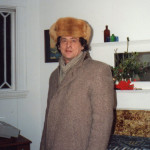When I meet someone new they almost always ask me this unwelcome question: “Where are you from?” I usually reply “I’m from Cambridge” hoping this response will stop their questions. I’d rather not talk about my past with strangers, but it’s always obvious to people that my accent is foreign, not regional, and they want to pin it down. To me, my accent is like a fingerprint to a criminal: impossible to get rid of. Maybe there is even more than the accent–something intangible that indicates I am from a different culture. Sometimes I wonder what it means to know a language and whether it is possible to really learn a language when you start at age 44.
Language and culture are so strongly entwined that you can’t separate them. When I lived in the Soviet Union the word “kupitz” (to buy) was replaced in the vernacular by the word “dostatz” (to get). Why? Because you couldn’t just go to a store and buy what you wanted—most of the stores were empty. So to “get” something you either had to stand in a long line or know someone who had been fortunate enough to get it by standing in the right line. It got so that if you saw a bunch of people standing in line, often you would just get in that line and ask people “sto dayut?” (what are they giving?), because it might be something you wanted. There is a joke related to this. A guy gets in a long line, asks “sto dayut?” and is told they are selling cheese, which he wants. Finally he gets to the front of the line, gets his piece of cheese and begins to eat it. But it tastes terrible because it is not cheese but soap. (The soap and the cheese in the USSR looked alike.) Nevertheless he continues to eat it, saying “ya tibya kupil, ya tibya s’iem” (I bought you, so I will eat you).
To obtain books was even more complicated. So many books were banned by the government. And if not banned they were published in such small quantities that they were precious, almost like currency. (Except books about communist leaders, which no one wanted to read—they were everywhere, like dirt.) If we heard that an interesting new book might possibly come out, people would go and stand in line at a bookstore just on the chance that the book might come in to the store.
A foreigner would not understand the phrase “sto dayut?” or the cheese vs. soap joke, or the difficulty getting books, without an understanding of Soviet reality. So in the same way I suppose people will go on asking me “Where are you from?” But I plan to keep on replying “I’m from Cambridge.”
A Dream
July 22, 2009
Last night I dreamt I was in Russia and there was a huge airplane flying overhead. It dropped something enormous and at first I thought this thing looked very interesting and intriguing, like a giant sculpture. But it turned out to be a huge net and it dropped on me; I was trapped along with some other people. But a guy near me had a cigarette and we were able to burn a hole in the net. Pretty often I dream that I’m in Russia and I get caught, and in these dreams I’m thinking that I’m an American citizen and I can get away.
